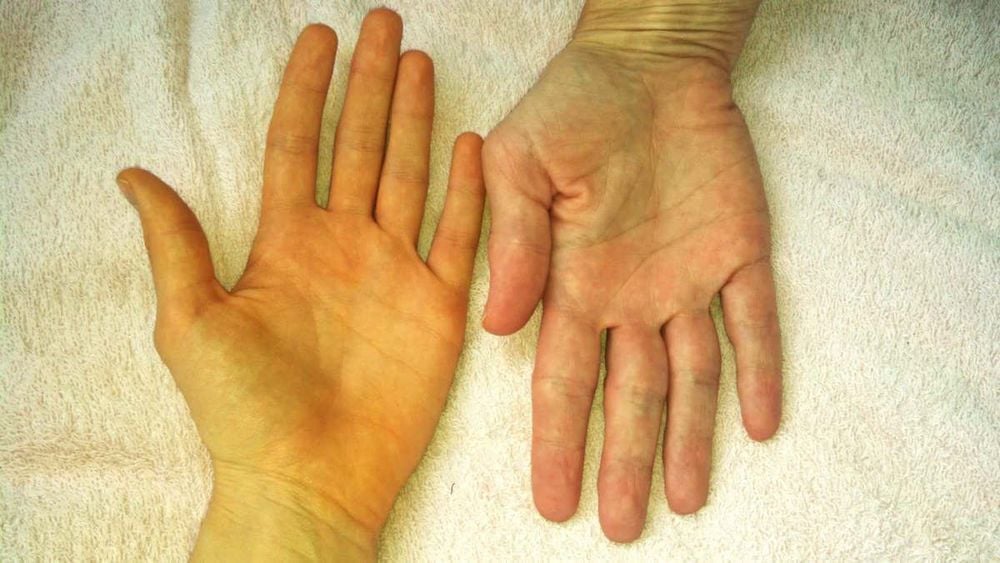This is an automatically translated article.
The article was professionally consulted by Doctor Tran Quoc Tuan - Emergency Resuscitation Doctor - Emergency Resuscitation Department - Vinmec Phu Quoc International General HospitalHepatitis B and hepatitis C are two very common diseases. Chronic hepatitis can be the cause of dangerous chronic liver diseases. The virus can be spread by sharing certain utensils with an infected person and can be passed from mother to child.
1. What is hepatitis B and hepatitis C?
Hepatitis B is an inflammatory lesion caused by the hepatitis B virus. Similarly, hepatitis C is an inflammatory lesion caused by the hepatitis C virus. Both forms of hepatitis are infectious and can progress. dangerous chronic diseases.
2. What is acute hepatitis?
Acute hepatitis is a state of hepatitis that occurs within the first 6 months after the patient is infected with the hepatitis B or C virus, the duration of the illness is short, and there are only mild symptoms or no symptoms at all. Symptoms, if present, may include:
Fatigue Loss of appetite Nausea and vomiting Jaundice (yellowing of the skin and eyes)

Vàng da là một trong những biểu hiện viêm gan cấp
Stomach pain Muscle and joint pain
3. What is chronic hepatitis?
Hepatitis virus stays in the body for a long time can lead to chronic hepatitis . People with chronic hepatitis who are infected with both hepatitis B and C viruses at the same time can develop serious chronic diseases, such as cirrhosis of the liver. In some cases, chronic hepatitis can lead to liver cancer.
4. What is a carrier?
A carrier of hepatitis B or hepatitis C virus will live with the virus for life and can completely transmit it to others.
Hepatitis B carriers are usually children under the age of 5, but a small number of adults become carriers. Most carriers of the virus have no symptoms, but a few cases progress to serious and fatal hepatitis. For hepatitis C, about 75-85% of adults infected with the hepatitis C virus will become carriers of the hepatitis C virus, of which about two-thirds of hepatitis C carriers will develop chronic liver disease. .

Người mang siêu vi viêm gan B thường là trẻ dưới 5 tuổi
5. The spread of hepatitis B virus
The hepatitis B virus is spread by direct contact with bodily fluids (such as blood, semen or vaginal fluids), for example by having unprotected sex, or by sharing needles. Hepatitis B can be passed from mother to baby during childbirth. In addition, living together and sharing some personal items such as brushes, razors with people with the virus also carries a potential risk of infection. Hepatitis B virus is not transmitted by casual contact such as shaking hands, sharing food, coughing, and sneezing, nor is it transmitted through breastfeeding.
6. Hepatitis B virus diagnostic test
Hepatitis B virus infection can be diagnosed by blood tests for different antiviral antibodies. These tests can check for people who are newly infected with the virus, or who have become chronic carriers of the virus. Through tests, doctors can even determine if a customer has had hepatitis B virus in the past and is now immune, or determines whether a customer has received the hepatitis B vaccine.
7. Subjects should be tested for hepatitis B virus
The following people are recommended to be tested for hepatitis B virus:
Pregnant women Children whose mothers are infected with the virus People whose sex partners are infected with the virus. Or live with someone who has the virus. People with HIV Disease Third-sex people Healthcare workers who come into contact with large numbers of patients are at risk of hepatitis B on a daily basis, especially nurses. People who were born or whose parents were born in an area with a high prevalence of hepatitis B virus infection. People who need kidney dialysis, cancer treatment, or drugs that suppress the immune system
8. Treatment for hepatitis B virus
There is no cure for the hepatitis B virus, however, it can control symptoms and treat liver diseases caused by the hepatitis B virus.
Vaccines are the most effective way to prevent hepatitis B, Boosts the body's immune system to fight the virus even after exposure. Hepatitis B regimen includes 3 shots.
People who have recently been exposed to the hepatitis B virus and have not been vaccinated, in addition to the vaccine, will receive an injection of Hepatitis B Immune Globulin (HBIG). HBIG contains antiviral antibodies, which further increase the effectiveness of preventing hepatitis B virus infection.
9. The spread of hepatitis C . virus
The hepatitis C virus is spread by direct blood-to-blood contact, eg sharing needles, and can be passed from mother to child. Although unlikely, the virus can also be transmitted through unprotected sex. The hepatitis C virus is not spread through casual contact.
10. Hepatitis C . virus diagnostic test

Xét nghiệm để kiểm tra người bệnh có virut viêm gan C hay không
To check if a patient has the hepatitis C virus, the doctor will order a few tests. The first is a test that indicates whether the client is infected with the hepatitis C virus. If the result is positive, confirmatory testing is done to verify the immunoassay and to determine the viral load.
11. Subjects should be tested for hepatitis C virus
Some people are at high risk such as:
People born between 1945 - 1965 Patients who have been or are on dialysis People with HIV People with abnormal liver enzymes Have blood transfusions from patients who are found to be positive for the virus hepatitis C after blood donation Health care workers who come into contact with large volumes of patients are at risk for hepatitis B on a daily basis, especially nurses. Children whose mothers have hepatitis C
12. Treatment for hepatitis C . virus
Treatment with antiviral drugs. Today, with advanced technology and medical knowledge, most patients with chronic hepatitis C can be cured. Treatment for hepatitis C also reduces the long-term complications of the disease.
13. How to prevent hepatitis C virus
There is currently no vaccine for hepatitis C, so each person should protect themselves in a few ways:
Use condoms during sex. Get to know your partner in sexual activity. At the same time, each person should have only one sexual partner.
Please dial HOTLINE for more information or register for an appointment HERE. Download MyVinmec app to make appointments faster and to manage your bookings easily.
Articles refer to the source Acog.org












